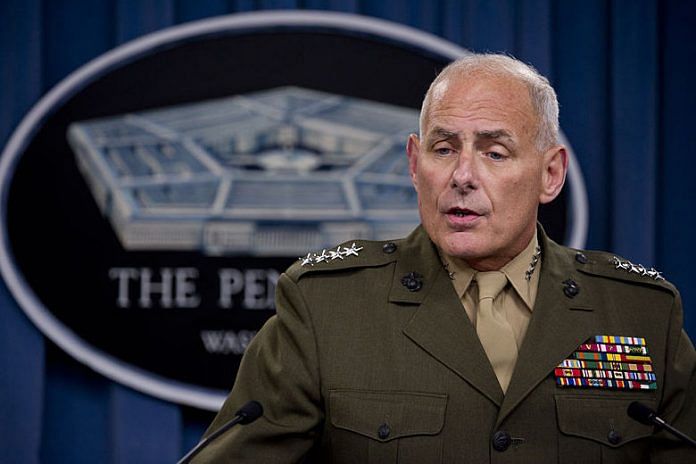US military is more influential than ever. And it’s a good thing
When the military assumes extraordinary powers in a country, it is typically reason to worry. Not in the US, though. As military leaders consolidate powers in the country, the president’s critics see them as “a calming force amid the daily chaos of the White House”. They counsel the volatile president, publicly contradict him and have even thwarted one of his most controversial military policies.
They do this not through confrontation, however. White House Chief of Staff John F. Kelly, Defense Secretary Jim Mattis and national security adviser H.R. McMaster have cultivated close personal relationships with the president, which give them ample room to cajole Trump into softening his stances. Viewed as “safeguards for the nation in a time of turbulence,” by both the Democrats and Republicans, they seem to currently be the bearers of liberal values in the US.
UK continues to cherry-pick from the EU club
“Britain is working hard to prove we can recreate what we already have,” a column recently read. Increasingly, it appears to be the case that even after the country formally exits the EU, it wants things to stay the same. Consider its position paper on civil judicial cooperation, which says, “We are seeking a close and comprehensive framework of civil judicial cooperation with the EU … which would mirror closely the current EU system.” Or the one on free movement of goods, which says, “Goods placed on the single market before exit should continue to circulate freely in the U.K. and the EU, without additional requirements or restrictions.”
Only this week, the Irish president said, “What they seem to have been suggesting all along … is they want to have all the advantages of being in the EU and none of the responsibilities and costs”. His are not isolated fears. Right after the referendum in the country, a year ago, European leaders feared that London would cherry-pick favourable provisions of being in the club. A year later, the fears seem to have come a full circle.
Trump’s Afghanistan speech lacked what the region needs most: an actual strategy
Donald Trump’s speech led to a flurry of reactions from across the world. While his appeal to India for help on Afghanistan set off alarm bells in Pakistan, its mighty ally China jumped to reaffirm its support to Islamabad and lauded it for its sacrifices in the fight against terrorism. In neighbouring Afghanistan, Hamid Karzai also slammed Trump’s plans, tweeting that “The strategy excludes bringing peace and prosperity to Afghanistan and is focused on more war and rivalry in the region”.
Predictably, though, Trump’s speech had his trademark all over it –ambiguity. After criticising the war in Afghanistan for many years, Trump suggested doing exactly that. He proposed to increase troops in Afghanistan, but did not specify how many. “We will not talk about numbers of troops or our plans for further military activities,” he said. He did say, though, that he’d win the conflict. How he intends to do so is perhaps for the world to guess.
After ‘fire and fury’ threat, secondary sanctions on Chinese and Russian companies
On a day China pledged support ally Pakistan in the wake up of a tougher US strategy, it paid the price for its ties with another ally: North Korea. The US slapped fresh sanctions on Chinese and Russian companies to cut off their support to Pyongyang. The Chinese, who are obviously not pleased, blasted the Trump administration for it “long arm jurisdiction” and urged Washington to “immediately correct its mistake”.
The most recent UN sanctions forbid UN member states from buying coal, iron ore, and other key commodities from North Korea, in an attempt to starve the country’s military of the cash it needs to develop its nuclear programme. According to members of the Security Council, this would slash down Pyongyang’s export revenue by $1 billion annually.
Jared Kushner in the Middle East
More than days ago, the White House announced Jared Kushner along with Security Adviser Dina Powell, and Middle East envoy Jason Greenblatt would be travelling to the Middle East. When they did go, last week, however, they did so quietly. The delegation is set to travel to Saudi Arabia, UAE, Jordan, Qatar and Israel.
The purpose of the trip is “focus on the path to substantive Israeli-Palestinian peace talks, combatting extremism, the situation in Gaza, including how to ease the humanitarian crisis there,” a White House official said. Yet, what the trip can really achieve remains unclear. It is Kushner’s third trip to the Middle East, and since his last visit in June, matters only seem to have worsened. Besides, the Trump administration has been able to inspire little confidence in Palestine, even as it harps on a two-state solution. “I can’t understand how they (US) are conducting themselves with us…Inside (Trump’s) country, there is chaos in the administration,” Mahmoud Abbas, president of the Palestinian Authority, had said.



